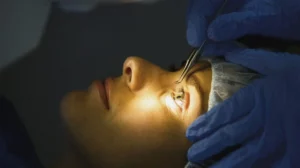In this article, we’ll explore the relationship between LASIK (Laser-Assisted In Situ Keratomileusis) surgery and glaucoma. And we will be shedding light on how these two vision-related topics intersect. Whether you’re considering LASIK for vision correction or you’re concerned about the impact on glaucoma, we’ve got you covered. So, let’s embark on this informative journey and discover the crucial details you need to know.
Contents
What Is LASIK?
 LASIK, which stands for Laser-Assisted In Situ Keratomileusis, is a popular refractive surgery technique. It is designed to correct common vision problems such as nearsightedness (myopia), farsightedness (hyperopia), and astigmatism. It is a safe and effective procedure that has helped millions of people worldwide reduce their dependence on glasses or contact lenses.
LASIK, which stands for Laser-Assisted In Situ Keratomileusis, is a popular refractive surgery technique. It is designed to correct common vision problems such as nearsightedness (myopia), farsightedness (hyperopia), and astigmatism. It is a safe and effective procedure that has helped millions of people worldwide reduce their dependence on glasses or contact lenses.
During the LASIK procedure, an ophthalmologist uses a specialized laser to reshape the cornea. That is the clear front part of the eye. By altering the cornea’s shape, the laser allows light to properly focus onto the retina at the back of the eye. And it will result in clearer vision.
The entire LASIK procedure is typically completed within minutes per eye. And is performed on an outpatient basis. Local anesthesia in the form of eye drops is administered to numb the eye, minimizing any potential discomfort.
Make sure to note that LASIK is not suitable for everyone. Candidates must meet certain criteria to enjoy these amazing eye surgery results. Though this has been widely recognized as a reliable and effective vision correction option, providing long-lasting results for many individuals.
What Is Glaucoma?
Glaucoma is a group of eye conditions that can cause damage to the optic nerve, which transmits visual information from the eye to the brain. It is often associated with elevated intraocular pressure (fluid pressure inside the eye). But it can also occur with normal or low eye pressure. If left untreated, glaucoma can lead to progressive vision loss and ultimately result in blindness.
The most common form of glaucoma is called primary open-angle glaucoma. It develops gradually and typically has no early symptoms. As the disease advances, peripheral vision is gradually impaired, eventually leading to tunnel vision and potentially complete vision loss. Early detection through regular eye exams and appropriate treatment can help slow down or prevent further vision loss associated with glaucoma.
Can LASIK Be Performed On Individuals With Glaucoma?
 The decision to perform LASIK on individuals with glaucoma requires careful evaluation and consideration by an experienced ophthalmologist. Generally, LASIK is not recommended for individuals with glaucoma due to the potential risks involved.
The decision to perform LASIK on individuals with glaucoma requires careful evaluation and consideration by an experienced ophthalmologist. Generally, LASIK is not recommended for individuals with glaucoma due to the potential risks involved.
Glaucoma is a complex eye condition characterized by optic nerve damage and often elevated intraocular pressure. LASIK surgery involves reshaping the cornea, which can temporarily increase intraocular pressure during the procedure. This elevation in pressure may pose risks for individuals with glaucoma, as it can further damage the optic nerve and potentially worsen their condition.
Moreover, individuals with glaucoma often require ongoing treatment. Such as medications or surgical interventions, to manage their intraocular pressure and prevent further optic nerve damage. Undergoing LASIK may interfere with the effectiveness of these treatments or complicate the management of glaucoma.
It is crucial for individuals with glaucoma to consult with their ophthalmologist or glaucoma specialist to determine the best course of action regarding vision correction options. The eye care professional will consider the individual’s unique circumstances and make recommendations based on their specific needs and the potential risks associated with LASIK surgery.
Is Glaucoma A Contraindication To LASIK?
Yes, glaucoma is generally considered a contraindication to LASIK surgery. A contraindication means that a specific condition or circumstance makes a particular treatment or procedure inadvisable or potentially risky.
It is important for individuals with glaucoma to discuss their condition with their ophthalmologist or glaucoma specialist to determine the most appropriate correction options. Alternative options, such as implantable contact lenses or refractive lens exchange, may be considered in consultation with the eye care professional, taking into account the individual’s overall eye health and the specific characteristics of their glaucoma.
What Are The Potential Risks Of LASIK And Glaucoma?
 When considering LASIK surgery for individuals with glaucoma, there are potential risks that need to be carefully evaluated. Here are some of the common ones:
When considering LASIK surgery for individuals with glaucoma, there are potential risks that need to be carefully evaluated. Here are some of the common ones:
- Elevated Intraocular Pressure: LASIK temporarily increases intraocular pressure during the procedure. In individuals with glaucoma, this elevation in pressure can potentially further damage the optic nerve and worsen their condition.
- Fluctuations in Intraocular Pressure: After LASIK, there can be temporary fluctuations in intraocular pressure, which may impact the management of glaucoma. It can affect the accuracy of measuring intraocular pressure and make it challenging to determine the effectiveness of glaucoma treatments.
- Medication Interference: Glaucoma is often managed through the use of eye drops or oral medications to regulate intraocular pressure. LASIK surgery may interfere with the effectiveness of these medications, making it difficult to control or manage glaucoma after the procedure.
- Progression of Glaucoma: LASIK surgery does not cure glaucoma or halt its progression. If glaucoma is left untreated or inadequately managed, it can continue to damage the optic nerve and lead to vision loss, despite undergoing LASIK.
- Corneal Thickness: Glaucoma can affect corneal thickness, and individuals with thin corneas may not be suitable candidates for LASIK. The cornea needs to have sufficient thickness to safely undergo the corneal reshaping procedure.
- Post-operative Care: Individuals with glaucoma often require ongoing monitoring and treatment. LASIK surgery may add additional complexities to post-operative care and follow-up, as glaucoma management needs to be carefully coordinated with the LASIK procedure to ensure optimal outcomes.
What Are Some Alternative Vision Correction Options for Glaucoma?
For individuals with glaucoma who are seeking vision correction options, there are alternative approaches to LASIK that can be considered. These alternatives take into account the specific needs and considerations of glaucoma patients. Here are a few options:
Implantable Contact Lenses (ICL)
ICLs are an alternative to LASIK that involves the implantation of a contact lens-like device inside the eye. This procedure can correct refractive errors while leaving the cornea untouched, making it potentially suitable for glaucoma patients. ICLs can provide a long-term solution for vision correction and can be beneficial for those with thin corneas or high refractive errors.
Refractive Lens Exchange (RLE)
Also known as lens replacement surgery, RLE involves removing the eye’s natural lens and replacing it with an artificial intraocular lens (IOL) to correct refractive errors. This procedure can be considered for glaucoma patients who have cataracts or those who prefer a more permanent solution for their vision correction needs. RLE can address both nearsightedness and farsightedness and can potentially reduce the need for glasses or contact lenses.
Hybrid Approaches
In some cases, a combination of procedures or customized approaches may be recommended for glaucoma patients. This could involve a collaborative effort between an ophthalmologist specializing in glaucoma management and a refractive surgeon. The goal is to find a tailored solution that addresses both the vision correction needs and the management of glaucoma, ensuring optimal outcomes.
Contact Lenses
 Depending on the severity and type of glaucoma, contact lenses may be a viable option for vision correction. However, the use of contact lenses should be carefully considered and monitored in consultation with an eye care professional. As certain types of contact lenses can affect intraocular pressure and require regular monitoring.
Depending on the severity and type of glaucoma, contact lenses may be a viable option for vision correction. However, the use of contact lenses should be carefully considered and monitored in consultation with an eye care professional. As certain types of contact lenses can affect intraocular pressure and require regular monitoring.
It is important for glaucoma patients to have a thorough discussion with their ophthalmologist or glaucoma specialist to explore the alternative vision correction options available to them. Each individual’s unique circumstances, including the severity of glaucoma, overall eye health, and personal preferences, should be taken into account. Only then, a professional can determine the most suitable approach for their specific needs.
Conclusion
In conclusion, understanding the relationship between LASIK and glaucoma is crucial for individuals seeking vision enhancement while managing glaucoma effectively. While LASIK surgery is generally considered a contraindication for glaucoma patients due to the potential risks associated with elevated intraocular pressure and interference with glaucoma treatments, alternative vision correction options can be explored.
By staying informed about the potential risks, and considering alternative options, individuals with glaucoma can make educated decisions regarding their vision correction. With proper evaluation and guidance from healthcare professionals, they can achieve optimal visual outcomes while safeguarding their eye health.
LASIK eye surgery is a safe 10-minute procedure to help you get rid of glasses. EyeMantra offers the most advanced LASIK options including PRK, Femto Lasik, SMILE surgery, Standard lasik, ICL and Contoura vision. If you have any questions on Lasik surgery in Delhi, Lasik surgery cost and Lasik procedure, call us at 9711116605 or email at [email protected].



I like this web site it’s a master piece! Glad I found this ohttps://69v.topn google.Blog monetyze